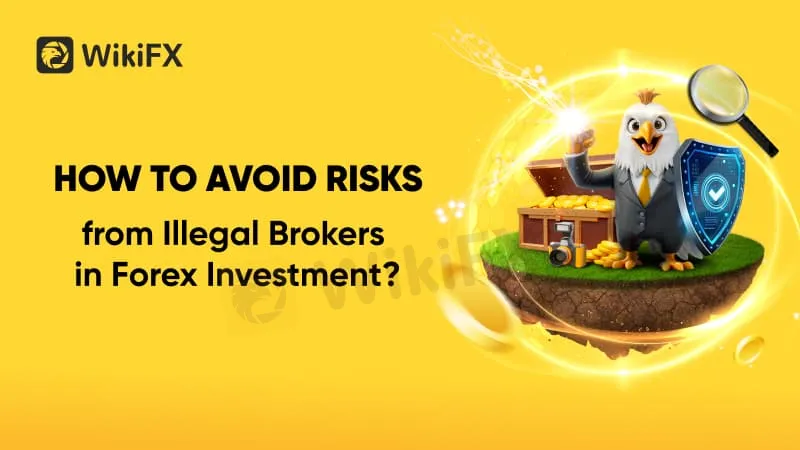简体中文
繁體中文
English
Pусский
日本語
ภาษาไทย
Tiếng Việt
Bahasa Indonesia
Español
हिन्दी
Filippiiniläinen
Français
Deutsch
Português
Türkçe
한국어
العربية
How to Avoid Risks from Scam Brokers in Forex Investment?
Abstract:In recent years, the forex market has become a popular choice for global investors due to its high liquidity and 24-hour trading advantages. However, according to the recently concluded WikiFX "3·15 Forex Rights Protection Day " event, we received over 6,000 pieces of evidence exposing rights violations within a short period. This reflects that, although the forex industry is becoming more regulated, fraudulent platforms continue to emerge, causing significant suffering for many victims.

Introduction: Opportunities and Pitfalls in the Forex Market
In recent years, the forex market has become a popular choice for global investors due to its high liquidity and 24-hour trading advantages. However, according to the recently concluded WikiFX “3·15 Forex Rights Protection Day ” event, we received over 6,000 pieces of evidence exposing rights violations within a short period. This reflects that, although the forex industry is becoming more regulated, fraudulent platforms continue to emerge, causing significant suffering for many victims.
These illegal brokers often lure investors with promises of “high returns” and “zero risk,” and some even impersonate well-known brokers. In reality, they profit through false advertising, money schemes, or outright theft of funds. In such a complex market environment, learning to verify a broker's regulatory licenses has become the first line of defense for forex investors to avoid risks.
Broker Regulatory Licenses: Legitimacy is the Lifeline
Each country has its own authoritative regulatory bodies, such as the NFA (USA), ASIC (Australia), and FCA (UK). Brokers operating in these jurisdictions are subject to strict oversight by local regulators. However, investors should be cautious:
- Beware of “Regulatory” Traps: Some platforms claim to hold licenses from certain countries or regions, but these jurisdictions may have lax regulations or be small islands with minimal oversight. While they may issue licenses, the associated risks remain high.
- Verify the Authenticity of Regulatory Numbers: Some illegal platforms provide fake regulatory licenses. Investors must verify the legitimacy of these licenses by checking the broker's name or license number on the official regulatory website.
Before depositing funds, investors must conduct the following checks on a broker:
- Regulatory Bodies: Is the broker regulated by top-tier authorities like NFA, ASIC, or FCA?
- License Scope: Does the license cover all types of services offered by the broker?
- Historical Record: Has the broker been penalized for violations or involved in fund misappropriation cases?
- Fund Segregation: Are client funds held in segregated accounts with third-party banks, and can this be verified?
- Localized Services: Does the broker provide compliant localized services and support?
How Can Investors Quickly Identify Regulatory Risks?
For many forex investors, identifying regulatory traps and verifying license authenticity can be challenging. Due to a lack of in-depth industry knowledge, these risks are often overlooked. How can investors simplify and safely verify the authenticity of regulatory bodies?
By leveraging WikiFX's global expertise and over a decade of industry experience, the WikiFX Rating System's regulatory index can quickly help investors identify regulatory risks.
The regulatory index is a quantitative assessment of a broker's regulatory status, developed by WikiFX's professional team using regulation grading standards, actual regulation values, regulation effectiveness models, and regulation anomaly prediction models. Through rigorous and scientific algorithms, it helps investors minimize trading risks to the greatest extent possible.
Rational Investing Starts with Respecting the Rules
The forex market offers no shortcuts to “overnight wealth” but is riddled with traps that prey on the uninformed. By rigorously verifying broker qualifications and effectively utilizing WikiFX, investors can keep risks within manageable limits. Please remember that safety is the foundation of trading.
Choose Brokers with WikiFX for Safer Forex Investment!

Disclaimer:
The views in this article only represent the author's personal views, and do not constitute investment advice on this platform. This platform does not guarantee the accuracy, completeness and timeliness of the information in the article, and will not be liable for any loss caused by the use of or reliance on the information in the article.
Read more

The Deepening Roots of Forex Scams in India
Check out how forex scams in India have expanded beyond banks and unregistered brokers to include the informal gang racket duping investors every day.

Important Statement on the Authenticity of WikiFX Score and Broker Reviews
WikiFX is committed to enhancing transparency and security in the forex industry through technological means and publicly available data. We firmly believe that fair information disclosure and a scientific evaluation system can genuinely safeguard investors’ rights and boost the healthy development of the industry.

Trade Nation vs. HYCM: Which Broker Should You Choose?
When it comes to online forex trading, picking the right broker can make a big difference. Two popular choices, Trade Nation and HYCM, that offer different features, rules, and trading conditions. Both are regulated by financial authorities, but they follow different approaches in areas like fees, trading tools, and customer support. This comparison helps traders understand which platform might suit their needs better.

BaFin Flags Surge in Unauthorized Financial Platforms and Identity Fraud Cases
Scammers are using cloned websites and fake licenses to trick investors. BaFin has flagged seven such entities this week. Before investing, always cross-check broker credentials on WikiFX.
WikiFX Broker
Latest News
U.S. consumer prices rose 2.4% in May, below expectations
ASIC Flags New Threat: Unlicensed Finfluencers Targeting Aussie Youth Through Hype Culture
Markets4you Launches Global Giveaway to Celebrate 18th Anniversary
How to Choose the Right VPS for Forex Trading
Webull Adds Crypto Trading Through Kalshi Partnership
Investment Scam Exposed: Deepfake Videos of Top Indian Leaders & Tech Icons misused to Lure Investor
HYCM Flagged by Malaysia’s Securities Commission
AMarkets Review 2025: Read Before Trade
Global Introducing Broker Growth Sharing Campaign
Boosted by U.S. CPI, Yen May Rise Again
Currency Calculator


